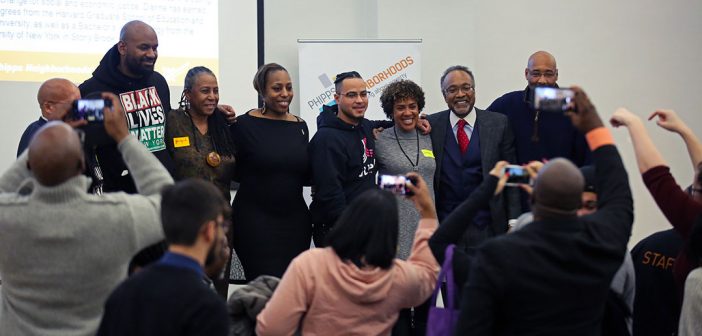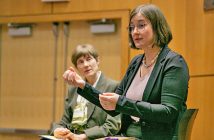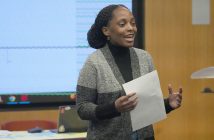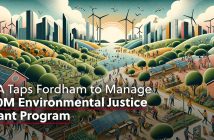Local nonprofit Phipps Neighborhoods, which aims to help youth and families overcome poverty, partnered with Fordham’s Center for Community Engaged Learning, Office of Multicultural Affairs, and Office of the Chief Diversity Officer to host the event. More than 300 attendees, many of them young Bronx residents who participate in Phipps Neighborhoods programs, braved frigid temperatures to gather at the McGinley Center and reflect on how King’s message can inform contemporary activists.
“We’re happy to broaden the conversation beyond the details of Martin Luther King’s life so that we can have some serious, courageous conversation about how we can continue that legacy for justice,” said Mark L. Chapman, Ph.D., a professor of African and African American Studies at Fordham, who moderated a panel discussion at the event.
A ‘Clarion Call’ to Today’s Activists
Dianne Morales, executive director and CEO of Phipps Neighborhoods, said the event’s theme, “Courageous Conversation in Action: Creating Brave Spaces to Stand for Justice,” reflected the importance of commemorating King’s life and work with discussions that “spotlight issues where struggle is still needed,” such as racial inequities in education and employment.
In her opening remarks, Morales said King “was focused on the need for all of us to call out racism, discrimination, and inequality—to take this country to task and create change in the systems and institutions that perpetuate those disparities in our communities.”
She said that by having these conversations and working to fight these injustices, we honor his spirit.
“We recognize, moreover, that his clarion call is as relevant today as when he walked across the Edmund Pettus Bridge in 1965,” she said.
Intergenerational Lessons
In his keynote speech, the Rev. Dr. C. Vernon Mason reminded the audience that King was just 26 years old when he played a pivotal role in the Montgomery Bus Boycott.
“I don’t want anyone to leave here today thinking Dr. King was an elder,” Mason said. “Dr. King was a very young person. Don’t let old folks tell you that you’ve got to be old to do something.”
Mason, a visiting professor at the New York Theological Seminary, drew on his own experience as a civil rights attorney in reminding older attendees that bridging generational divides is essential to carrying on the work of the civil rights movement. “Young people have something to teach us, and we certainly have something to share with them,” he said.
A panel discussion moderated by Chapman featured community leaders at the forefront of today’s civil rights struggles, including Hawk Newsome, chair of the New York chapter of Black Lives Matter; criminal justice reform advocate Vidal Guzman; and Yaniyah Pearson, director of restorative practices and equity initiatives at the New York nonprofit Ramapo for Children.
In response to a question from Chapman about mentorship, panelist Nakita Vanstory, the director of Justice Community and Justice PLUS Programs at LaGuardia Community College, said she often finds inspiration in the young people she works with. “When I feel like giving up or I feel like I’m not making a difference, I think of all the people who are silently mentoring me and I think about the difference that I’ve made in my students,” she said. “That’s where I get my motivation.”
Community Partnerships: A Foundation for Change
Arto Woodley, executive director of the Center for Community Engaged Learning, said the event and the conversation it inspired are “at the core” of Fordham’s mission. But, he cautioned, “Having the conversation starts the process, but by no means ends the process.” He added that working with neighbors such as Phipps Neighborhoods will help the Fordham community meet the challenge of translating intellectual discussion into concrete action and leadership.
“Our goal is that this event is beginning of something we’ll do on an annual basis,” Woodley said.
Morales said that for Phipps Neighborhoods, the collaborative nature of the event reflected “the role that the campus and University can and should play in lifting up the voices of the community it resides in.”
Engaging with the local community held special importance for Charlotte Hakikson, a senior at Fordham College at Rose Hill who grew up nearby in the Bronx. “I’ve always enjoyed when we have events that invite the community to our campus and allow students to interact with the community that they’re living in,” she said.
Hakikson, a theology and African American studies major, said she was excited to see young people from the neighborhood at the event because she believes it is important for students to be exposed to King’s teachings and consider how those lessons can be applied today. “He’d say that there’s more work to do,” she said. “He’d still be fighting for more equity.”
–Michael Garofalo

















